Intercultural Skills and Leadership: Fostering Global Business Success
VerifiedAdded on 2020/05/28
|7
|1496
|72
Essay
AI Summary
This essay delves into the critical aspects of intercultural skills and leadership within the framework of global business operations. It examines the significance of a monocultural approach and strategic human resource management in fostering effective communication across cultures, promoting global business expansion, and managing a diverse workforce. The essay highlights the importance of global leadership skills in developing cultural intelligence, motivating employees, and overcoming cultural barriers. It analyzes the role of training, communication, and the creation of multicultural teams in enhancing intercultural skills, as well as the integration of strategic HRM approaches to facilitate business activities. The essay also explores how intercultural skills are essential for employees navigating new workplaces and cultures, contributing to organizational efficiency. It emphasizes the interrelation between motivation and leadership, and how these elements influence the success of global business management, drawing on examples from companies like Ueltzen & Company and McKinsey. Finally, the essay concludes by summarizing the key concepts of intercultural skills and leadership, highlighting their impact on global business management and the establishment of strong workplace relationships.
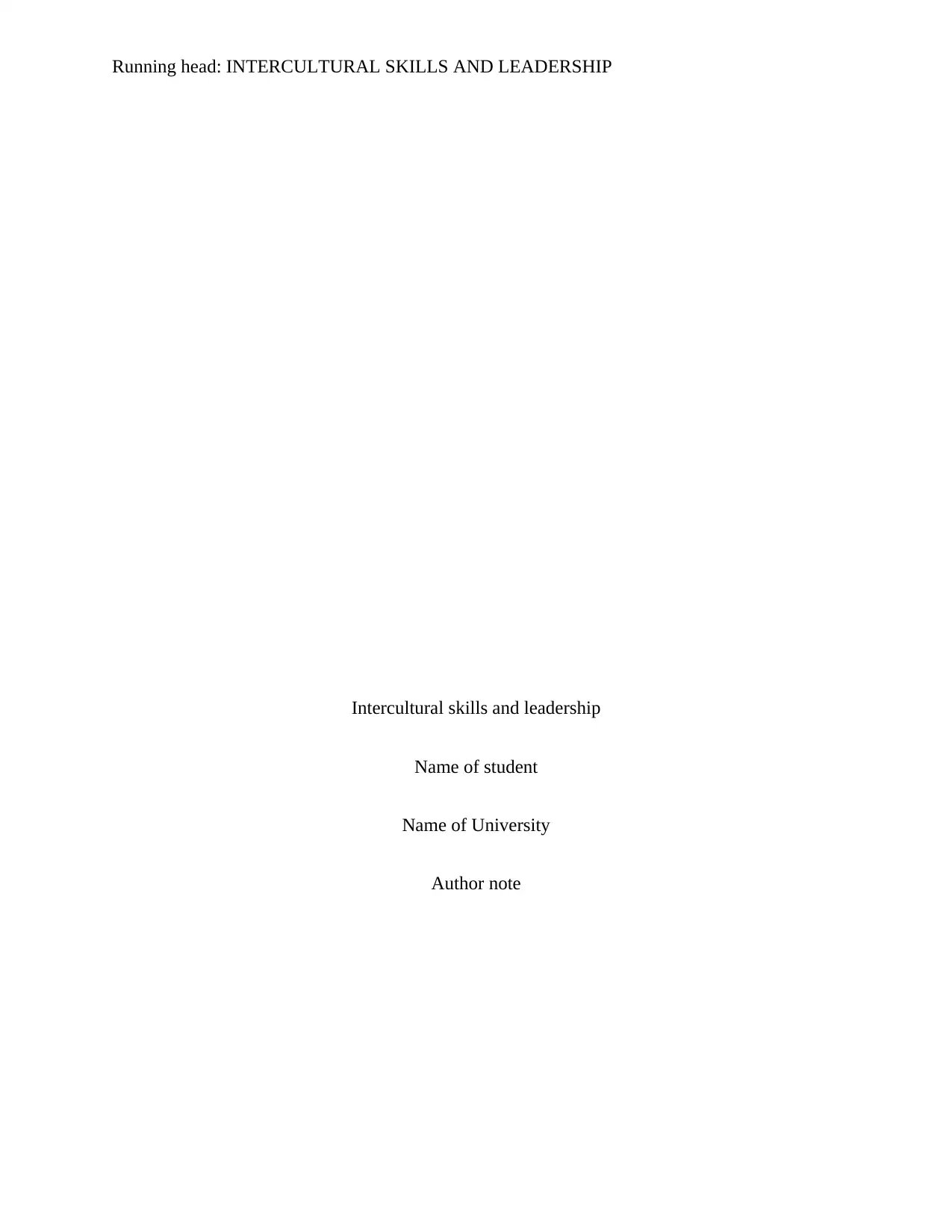
Running head: INTERCULTURAL SKILLS AND LEADERSHIP
Intercultural skills and leadership
Name of student
Name of University
Author note
Intercultural skills and leadership
Name of student
Name of University
Author note
Paraphrase This Document
Need a fresh take? Get an instant paraphrase of this document with our AI Paraphraser
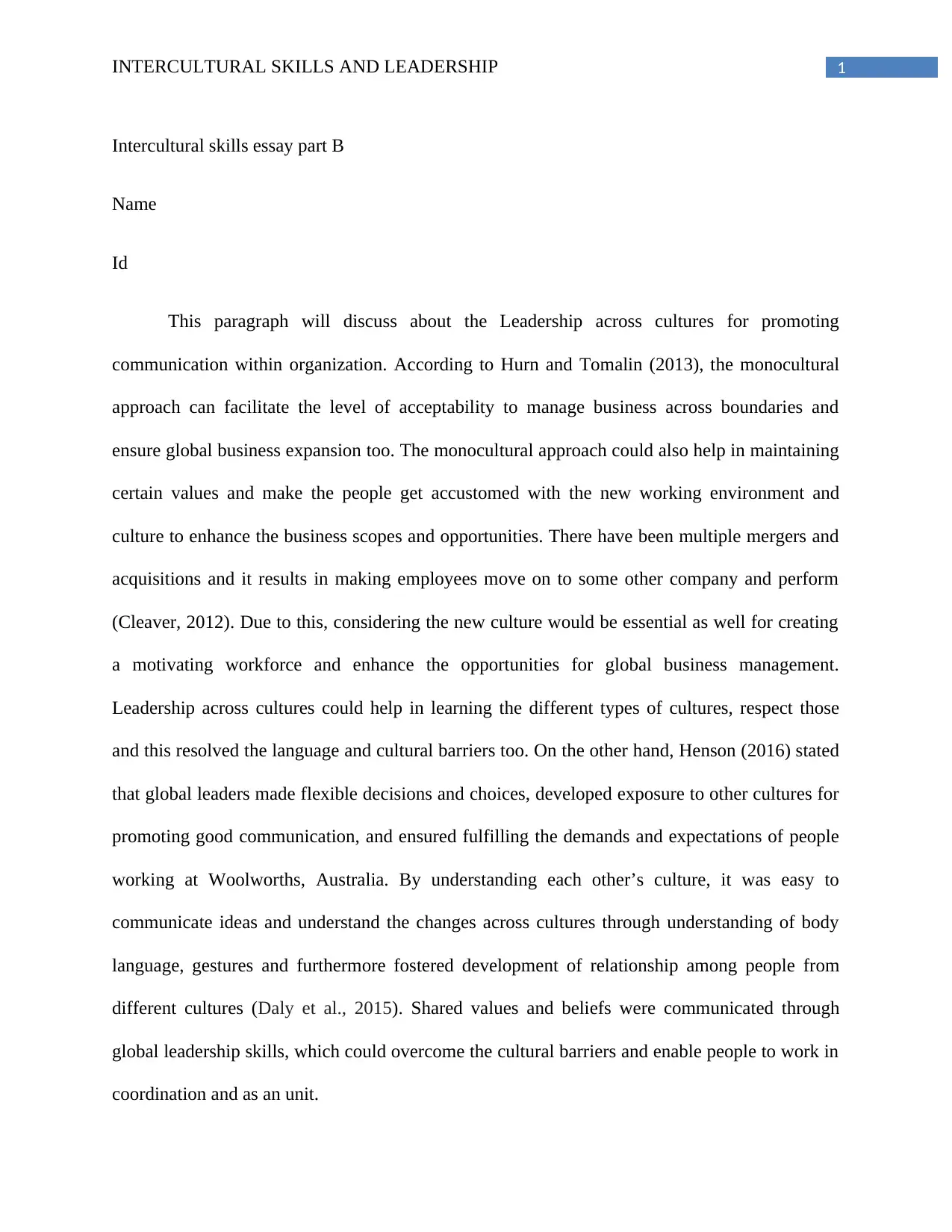
1INTERCULTURAL SKILLS AND LEADERSHIP
Intercultural skills essay part B
Name
Id
This paragraph will discuss about the Leadership across cultures for promoting
communication within organization. According to Hurn and Tomalin (2013), the monocultural
approach can facilitate the level of acceptability to manage business across boundaries and
ensure global business expansion too. The monocultural approach could also help in maintaining
certain values and make the people get accustomed with the new working environment and
culture to enhance the business scopes and opportunities. There have been multiple mergers and
acquisitions and it results in making employees move on to some other company and perform
(Cleaver, 2012). Due to this, considering the new culture would be essential as well for creating
a motivating workforce and enhance the opportunities for global business management.
Leadership across cultures could help in learning the different types of cultures, respect those
and this resolved the language and cultural barriers too. On the other hand, Henson (2016) stated
that global leaders made flexible decisions and choices, developed exposure to other cultures for
promoting good communication, and ensured fulfilling the demands and expectations of people
working at Woolworths, Australia. By understanding each other’s culture, it was easy to
communicate ideas and understand the changes across cultures through understanding of body
language, gestures and furthermore fostered development of relationship among people from
different cultures (Daly et al., 2015). Shared values and beliefs were communicated through
global leadership skills, which could overcome the cultural barriers and enable people to work in
coordination and as an unit.
Intercultural skills essay part B
Name
Id
This paragraph will discuss about the Leadership across cultures for promoting
communication within organization. According to Hurn and Tomalin (2013), the monocultural
approach can facilitate the level of acceptability to manage business across boundaries and
ensure global business expansion too. The monocultural approach could also help in maintaining
certain values and make the people get accustomed with the new working environment and
culture to enhance the business scopes and opportunities. There have been multiple mergers and
acquisitions and it results in making employees move on to some other company and perform
(Cleaver, 2012). Due to this, considering the new culture would be essential as well for creating
a motivating workforce and enhance the opportunities for global business management.
Leadership across cultures could help in learning the different types of cultures, respect those
and this resolved the language and cultural barriers too. On the other hand, Henson (2016) stated
that global leaders made flexible decisions and choices, developed exposure to other cultures for
promoting good communication, and ensured fulfilling the demands and expectations of people
working at Woolworths, Australia. By understanding each other’s culture, it was easy to
communicate ideas and understand the changes across cultures through understanding of body
language, gestures and furthermore fostered development of relationship among people from
different cultures (Daly et al., 2015). Shared values and beliefs were communicated through
global leadership skills, which could overcome the cultural barriers and enable people to work in
coordination and as an unit.
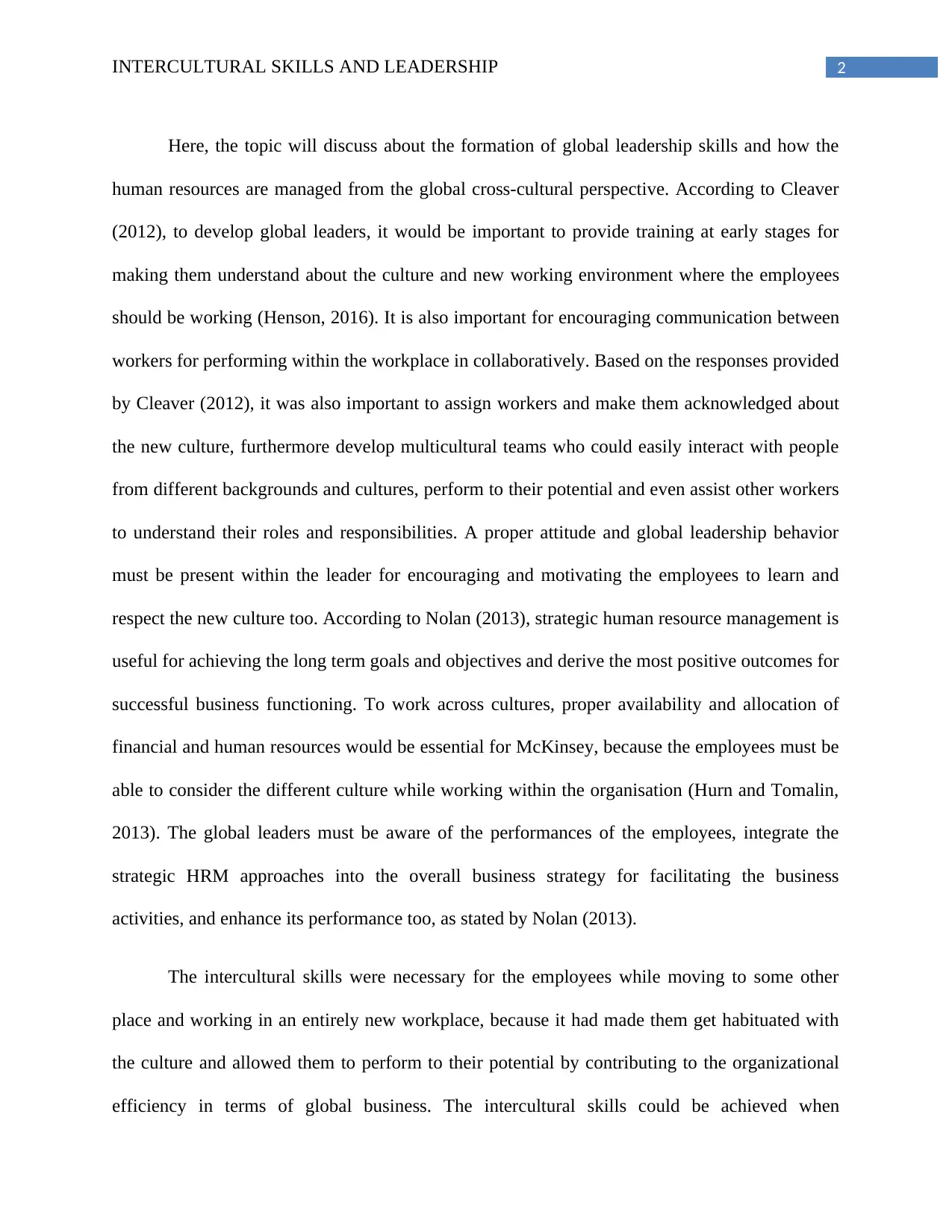
2INTERCULTURAL SKILLS AND LEADERSHIP
Here, the topic will discuss about the formation of global leadership skills and how the
human resources are managed from the global cross-cultural perspective. According to Cleaver
(2012), to develop global leaders, it would be important to provide training at early stages for
making them understand about the culture and new working environment where the employees
should be working (Henson, 2016). It is also important for encouraging communication between
workers for performing within the workplace in collaboratively. Based on the responses provided
by Cleaver (2012), it was also important to assign workers and make them acknowledged about
the new culture, furthermore develop multicultural teams who could easily interact with people
from different backgrounds and cultures, perform to their potential and even assist other workers
to understand their roles and responsibilities. A proper attitude and global leadership behavior
must be present within the leader for encouraging and motivating the employees to learn and
respect the new culture too. According to Nolan (2013), strategic human resource management is
useful for achieving the long term goals and objectives and derive the most positive outcomes for
successful business functioning. To work across cultures, proper availability and allocation of
financial and human resources would be essential for McKinsey, because the employees must be
able to consider the different culture while working within the organisation (Hurn and Tomalin,
2013). The global leaders must be aware of the performances of the employees, integrate the
strategic HRM approaches into the overall business strategy for facilitating the business
activities, and enhance its performance too, as stated by Nolan (2013).
The intercultural skills were necessary for the employees while moving to some other
place and working in an entirely new workplace, because it had made them get habituated with
the culture and allowed them to perform to their potential by contributing to the organizational
efficiency in terms of global business. The intercultural skills could be achieved when
Here, the topic will discuss about the formation of global leadership skills and how the
human resources are managed from the global cross-cultural perspective. According to Cleaver
(2012), to develop global leaders, it would be important to provide training at early stages for
making them understand about the culture and new working environment where the employees
should be working (Henson, 2016). It is also important for encouraging communication between
workers for performing within the workplace in collaboratively. Based on the responses provided
by Cleaver (2012), it was also important to assign workers and make them acknowledged about
the new culture, furthermore develop multicultural teams who could easily interact with people
from different backgrounds and cultures, perform to their potential and even assist other workers
to understand their roles and responsibilities. A proper attitude and global leadership behavior
must be present within the leader for encouraging and motivating the employees to learn and
respect the new culture too. According to Nolan (2013), strategic human resource management is
useful for achieving the long term goals and objectives and derive the most positive outcomes for
successful business functioning. To work across cultures, proper availability and allocation of
financial and human resources would be essential for McKinsey, because the employees must be
able to consider the different culture while working within the organisation (Hurn and Tomalin,
2013). The global leaders must be aware of the performances of the employees, integrate the
strategic HRM approaches into the overall business strategy for facilitating the business
activities, and enhance its performance too, as stated by Nolan (2013).
The intercultural skills were necessary for the employees while moving to some other
place and working in an entirely new workplace, because it had made them get habituated with
the culture and allowed them to perform to their potential by contributing to the organizational
efficiency in terms of global business. The intercultural skills could be achieved when
⊘ This is a preview!⊘
Do you want full access?
Subscribe today to unlock all pages.

Trusted by 1+ million students worldwide
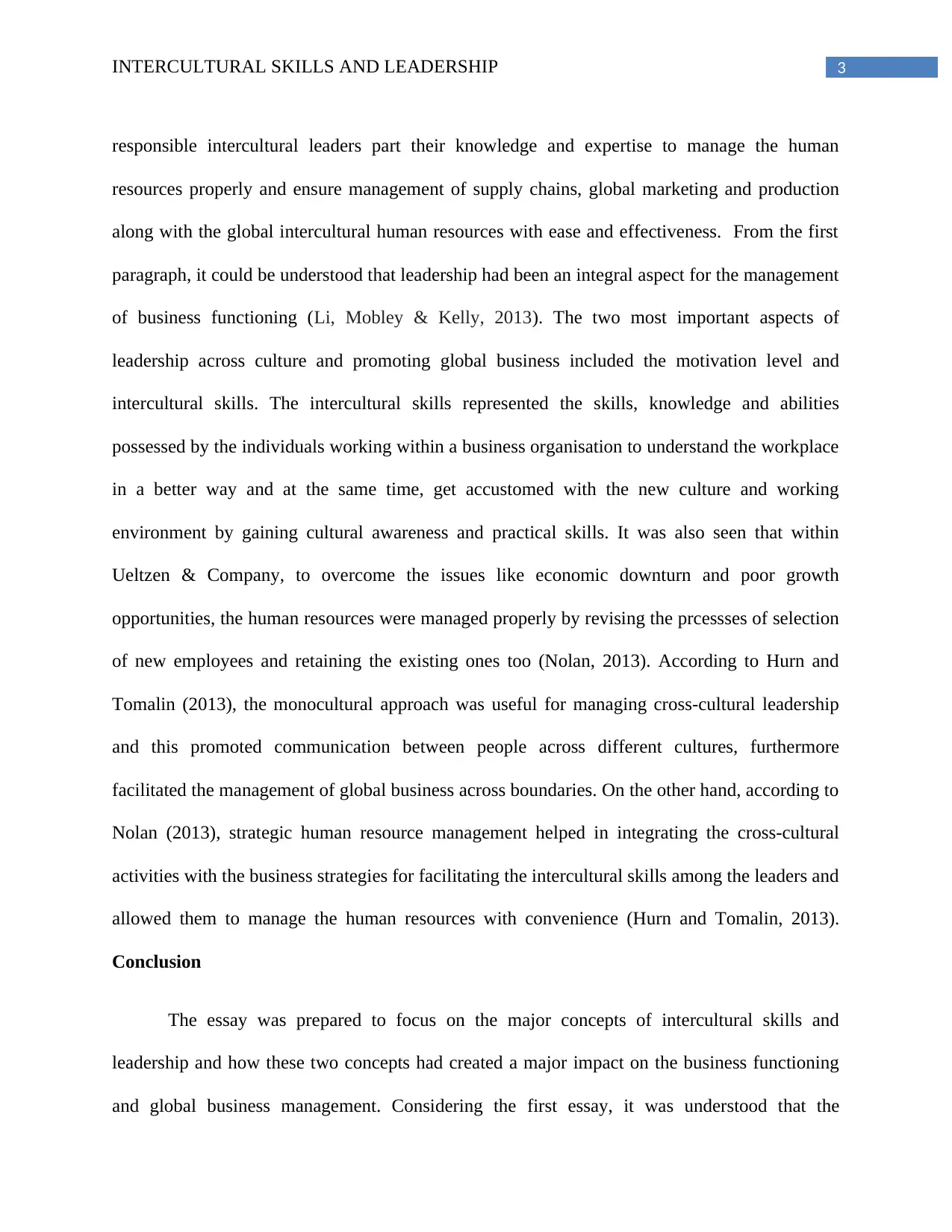
3INTERCULTURAL SKILLS AND LEADERSHIP
responsible intercultural leaders part their knowledge and expertise to manage the human
resources properly and ensure management of supply chains, global marketing and production
along with the global intercultural human resources with ease and effectiveness. From the first
paragraph, it could be understood that leadership had been an integral aspect for the management
of business functioning (Li, Mobley & Kelly, 2013). The two most important aspects of
leadership across culture and promoting global business included the motivation level and
intercultural skills. The intercultural skills represented the skills, knowledge and abilities
possessed by the individuals working within a business organisation to understand the workplace
in a better way and at the same time, get accustomed with the new culture and working
environment by gaining cultural awareness and practical skills. It was also seen that within
Ueltzen & Company, to overcome the issues like economic downturn and poor growth
opportunities, the human resources were managed properly by revising the prcessses of selection
of new employees and retaining the existing ones too (Nolan, 2013). According to Hurn and
Tomalin (2013), the monocultural approach was useful for managing cross-cultural leadership
and this promoted communication between people across different cultures, furthermore
facilitated the management of global business across boundaries. On the other hand, according to
Nolan (2013), strategic human resource management helped in integrating the cross-cultural
activities with the business strategies for facilitating the intercultural skills among the leaders and
allowed them to manage the human resources with convenience (Hurn and Tomalin, 2013).
Conclusion
The essay was prepared to focus on the major concepts of intercultural skills and
leadership and how these two concepts had created a major impact on the business functioning
and global business management. Considering the first essay, it was understood that the
responsible intercultural leaders part their knowledge and expertise to manage the human
resources properly and ensure management of supply chains, global marketing and production
along with the global intercultural human resources with ease and effectiveness. From the first
paragraph, it could be understood that leadership had been an integral aspect for the management
of business functioning (Li, Mobley & Kelly, 2013). The two most important aspects of
leadership across culture and promoting global business included the motivation level and
intercultural skills. The intercultural skills represented the skills, knowledge and abilities
possessed by the individuals working within a business organisation to understand the workplace
in a better way and at the same time, get accustomed with the new culture and working
environment by gaining cultural awareness and practical skills. It was also seen that within
Ueltzen & Company, to overcome the issues like economic downturn and poor growth
opportunities, the human resources were managed properly by revising the prcessses of selection
of new employees and retaining the existing ones too (Nolan, 2013). According to Hurn and
Tomalin (2013), the monocultural approach was useful for managing cross-cultural leadership
and this promoted communication between people across different cultures, furthermore
facilitated the management of global business across boundaries. On the other hand, according to
Nolan (2013), strategic human resource management helped in integrating the cross-cultural
activities with the business strategies for facilitating the intercultural skills among the leaders and
allowed them to manage the human resources with convenience (Hurn and Tomalin, 2013).
Conclusion
The essay was prepared to focus on the major concepts of intercultural skills and
leadership and how these two concepts had created a major impact on the business functioning
and global business management. Considering the first essay, it was understood that the
Paraphrase This Document
Need a fresh take? Get an instant paraphrase of this document with our AI Paraphraser
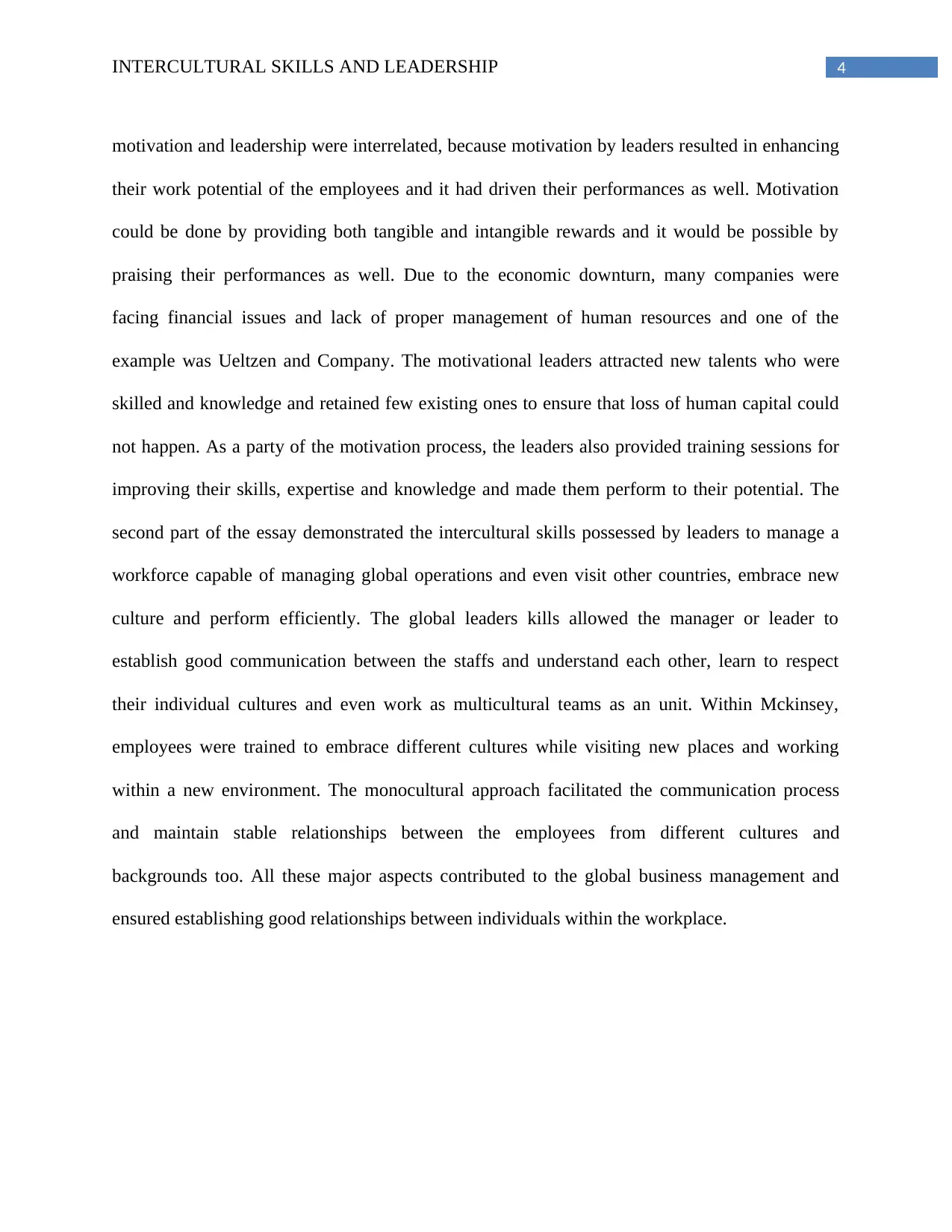
4INTERCULTURAL SKILLS AND LEADERSHIP
motivation and leadership were interrelated, because motivation by leaders resulted in enhancing
their work potential of the employees and it had driven their performances as well. Motivation
could be done by providing both tangible and intangible rewards and it would be possible by
praising their performances as well. Due to the economic downturn, many companies were
facing financial issues and lack of proper management of human resources and one of the
example was Ueltzen and Company. The motivational leaders attracted new talents who were
skilled and knowledge and retained few existing ones to ensure that loss of human capital could
not happen. As a party of the motivation process, the leaders also provided training sessions for
improving their skills, expertise and knowledge and made them perform to their potential. The
second part of the essay demonstrated the intercultural skills possessed by leaders to manage a
workforce capable of managing global operations and even visit other countries, embrace new
culture and perform efficiently. The global leaders kills allowed the manager or leader to
establish good communication between the staffs and understand each other, learn to respect
their individual cultures and even work as multicultural teams as an unit. Within Mckinsey,
employees were trained to embrace different cultures while visiting new places and working
within a new environment. The monocultural approach facilitated the communication process
and maintain stable relationships between the employees from different cultures and
backgrounds too. All these major aspects contributed to the global business management and
ensured establishing good relationships between individuals within the workplace.
motivation and leadership were interrelated, because motivation by leaders resulted in enhancing
their work potential of the employees and it had driven their performances as well. Motivation
could be done by providing both tangible and intangible rewards and it would be possible by
praising their performances as well. Due to the economic downturn, many companies were
facing financial issues and lack of proper management of human resources and one of the
example was Ueltzen and Company. The motivational leaders attracted new talents who were
skilled and knowledge and retained few existing ones to ensure that loss of human capital could
not happen. As a party of the motivation process, the leaders also provided training sessions for
improving their skills, expertise and knowledge and made them perform to their potential. The
second part of the essay demonstrated the intercultural skills possessed by leaders to manage a
workforce capable of managing global operations and even visit other countries, embrace new
culture and perform efficiently. The global leaders kills allowed the manager or leader to
establish good communication between the staffs and understand each other, learn to respect
their individual cultures and even work as multicultural teams as an unit. Within Mckinsey,
employees were trained to embrace different cultures while visiting new places and working
within a new environment. The monocultural approach facilitated the communication process
and maintain stable relationships between the employees from different cultures and
backgrounds too. All these major aspects contributed to the global business management and
ensured establishing good relationships between individuals within the workplace.
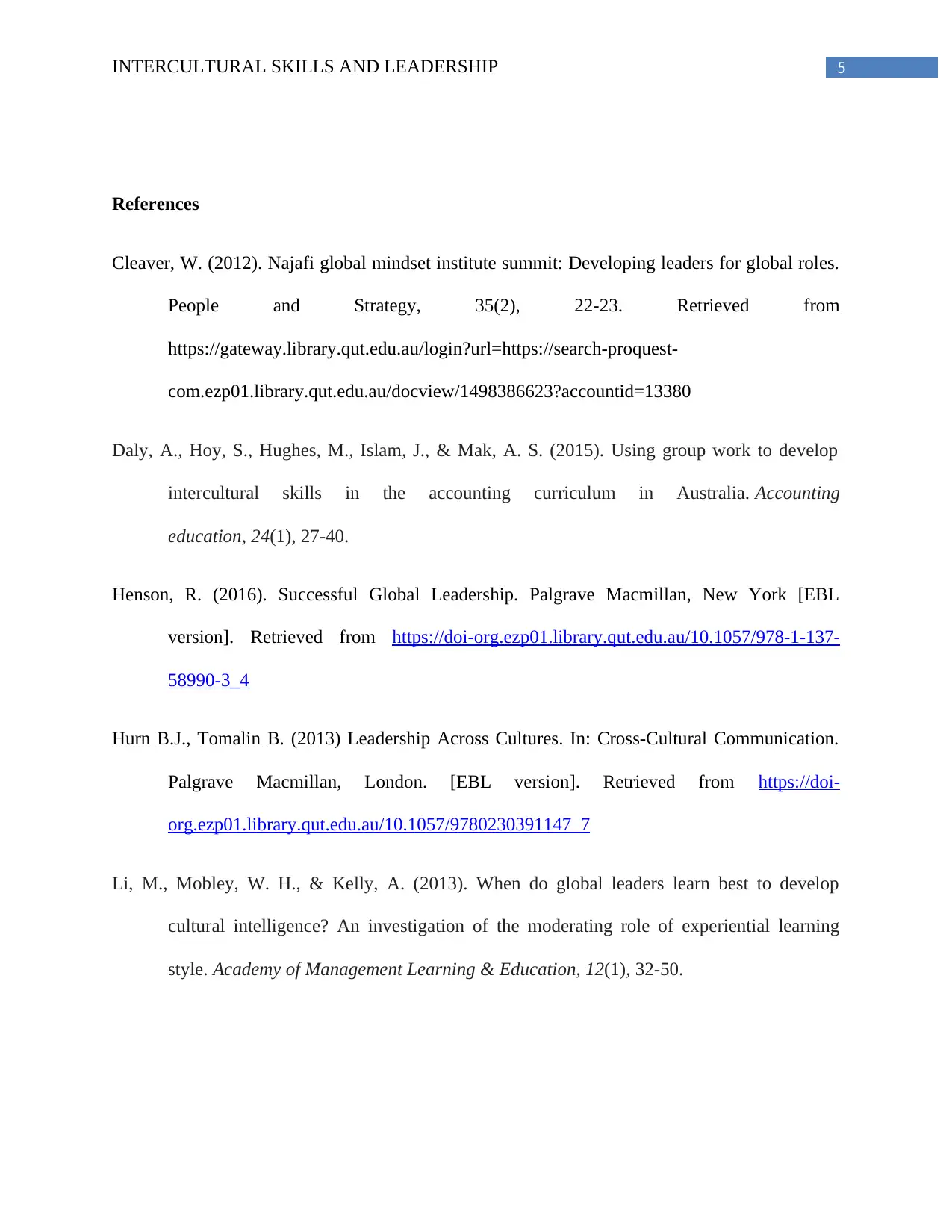
5INTERCULTURAL SKILLS AND LEADERSHIP
References
Cleaver, W. (2012). Najafi global mindset institute summit: Developing leaders for global roles.
People and Strategy, 35(2), 22-23. Retrieved from
https://gateway.library.qut.edu.au/login?url=https://search-proquest-
com.ezp01.library.qut.edu.au/docview/1498386623?accountid=13380
Daly, A., Hoy, S., Hughes, M., Islam, J., & Mak, A. S. (2015). Using group work to develop
intercultural skills in the accounting curriculum in Australia. Accounting
education, 24(1), 27-40.
Henson, R. (2016). Successful Global Leadership. Palgrave Macmillan, New York [EBL
version]. Retrieved from https://doi-org.ezp01.library.qut.edu.au/10.1057/978-1-137-
58990-3_4
Hurn B.J., Tomalin B. (2013) Leadership Across Cultures. In: Cross-Cultural Communication.
Palgrave Macmillan, London. [EBL version]. Retrieved from https://doi-
org.ezp01.library.qut.edu.au/10.1057/9780230391147_7
Li, M., Mobley, W. H., & Kelly, A. (2013). When do global leaders learn best to develop
cultural intelligence? An investigation of the moderating role of experiential learning
style. Academy of Management Learning & Education, 12(1), 32-50.
References
Cleaver, W. (2012). Najafi global mindset institute summit: Developing leaders for global roles.
People and Strategy, 35(2), 22-23. Retrieved from
https://gateway.library.qut.edu.au/login?url=https://search-proquest-
com.ezp01.library.qut.edu.au/docview/1498386623?accountid=13380
Daly, A., Hoy, S., Hughes, M., Islam, J., & Mak, A. S. (2015). Using group work to develop
intercultural skills in the accounting curriculum in Australia. Accounting
education, 24(1), 27-40.
Henson, R. (2016). Successful Global Leadership. Palgrave Macmillan, New York [EBL
version]. Retrieved from https://doi-org.ezp01.library.qut.edu.au/10.1057/978-1-137-
58990-3_4
Hurn B.J., Tomalin B. (2013) Leadership Across Cultures. In: Cross-Cultural Communication.
Palgrave Macmillan, London. [EBL version]. Retrieved from https://doi-
org.ezp01.library.qut.edu.au/10.1057/9780230391147_7
Li, M., Mobley, W. H., & Kelly, A. (2013). When do global leaders learn best to develop
cultural intelligence? An investigation of the moderating role of experiential learning
style. Academy of Management Learning & Education, 12(1), 32-50.
⊘ This is a preview!⊘
Do you want full access?
Subscribe today to unlock all pages.

Trusted by 1+ million students worldwide
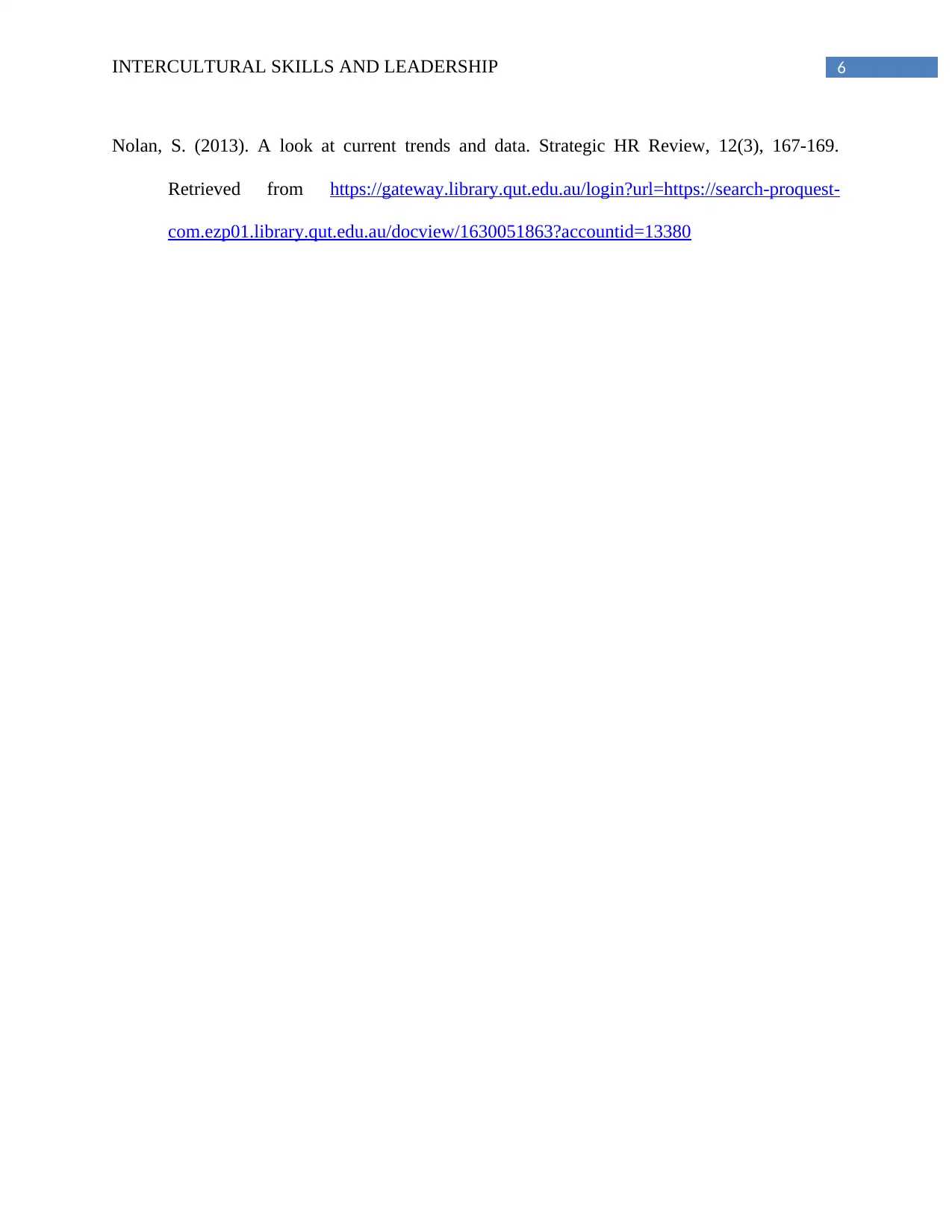
6INTERCULTURAL SKILLS AND LEADERSHIP
Nolan, S. (2013). A look at current trends and data. Strategic HR Review, 12(3), 167-169.
Retrieved from https://gateway.library.qut.edu.au/login?url=https://search-proquest-
com.ezp01.library.qut.edu.au/docview/1630051863?accountid=13380
Nolan, S. (2013). A look at current trends and data. Strategic HR Review, 12(3), 167-169.
Retrieved from https://gateway.library.qut.edu.au/login?url=https://search-proquest-
com.ezp01.library.qut.edu.au/docview/1630051863?accountid=13380
1 out of 7
Related Documents
Your All-in-One AI-Powered Toolkit for Academic Success.
+13062052269
info@desklib.com
Available 24*7 on WhatsApp / Email
![[object Object]](/_next/static/media/star-bottom.7253800d.svg)
Unlock your academic potential
Copyright © 2020–2026 A2Z Services. All Rights Reserved. Developed and managed by ZUCOL.




